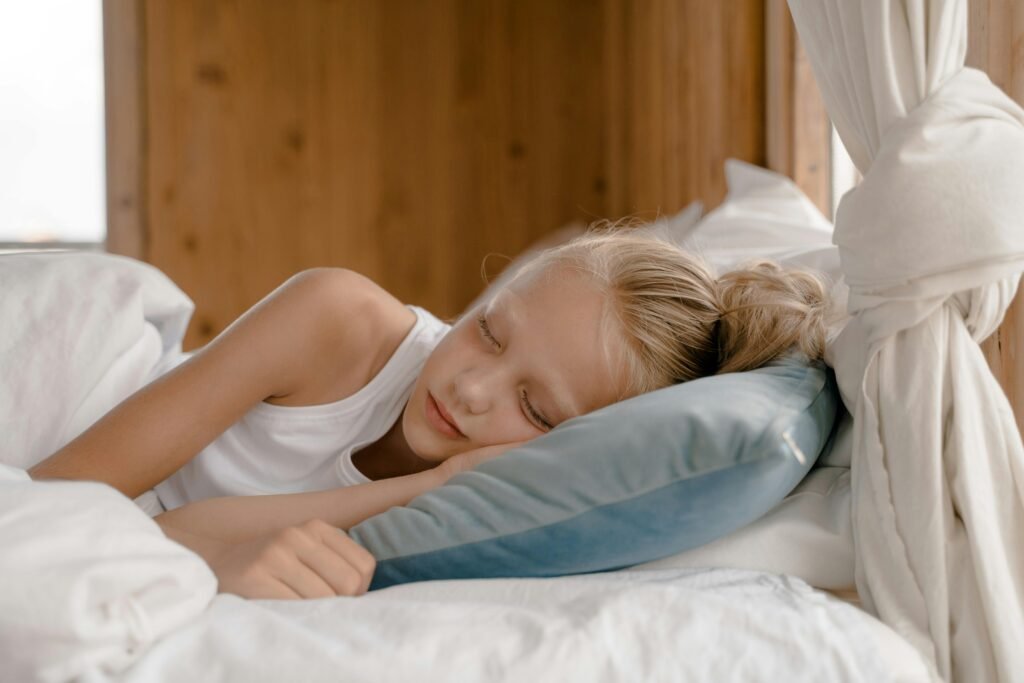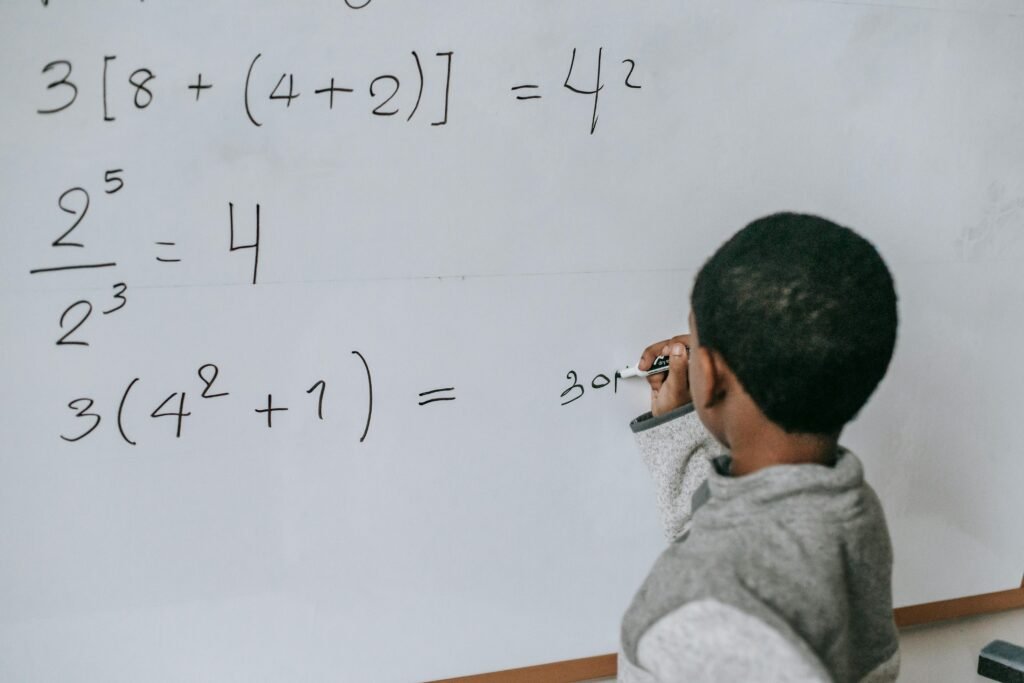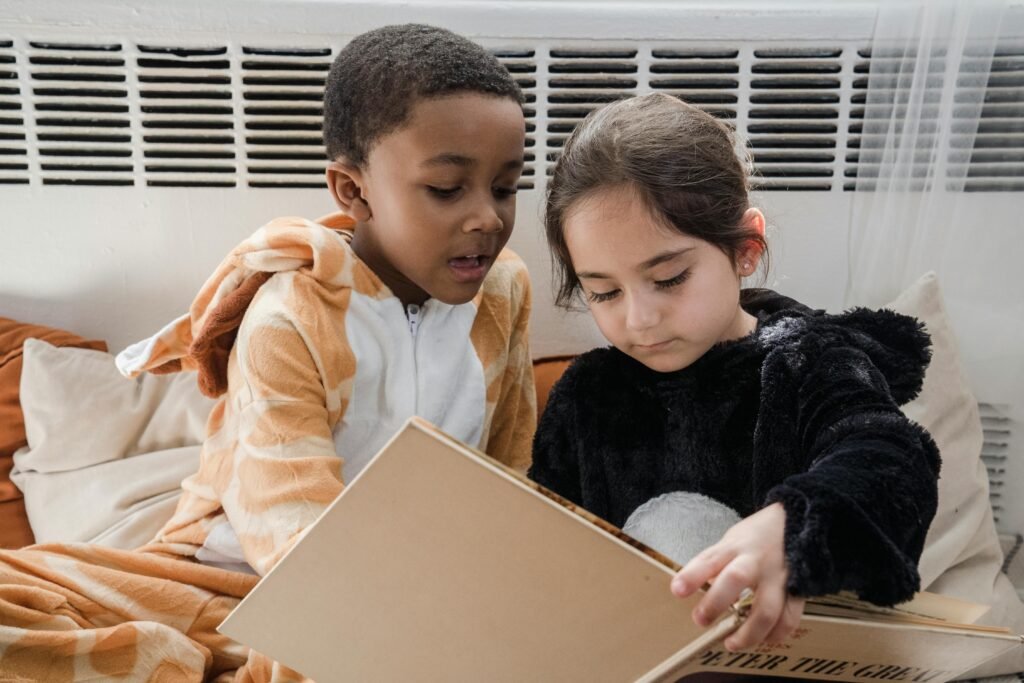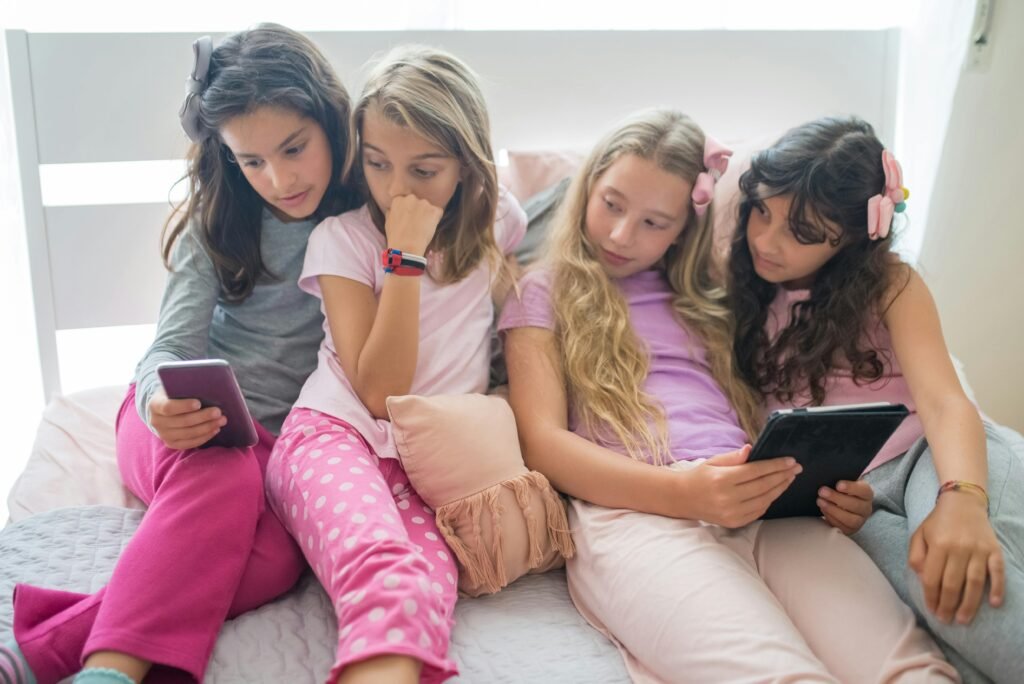We all know that getting a good night’s sleep helps kids focus, learn better, and feel good the next day. But what if something as small as the light from a phone or tablet at night is getting in the way? That’s where blue light comes in. Blue light is a kind of light that comes from screens—phones, tablets, computers, and TVs. It might not seem like a big deal, but when kids look at screens before bed, it can really mess with their sleep and learning.
Exposure to blue light before bed can suppress melatonin production by up to 85%
Melatonin is the hormone that tells your body it’s time to sleep. Think of it like a natural bedtime whisper. But when your child looks at a screen at night—whether it’s a tablet, phone, or laptop—that blue light shining in their eyes can tell their brain, “Hey, it’s still daytime!” That tricks the body into holding back on melatonin.
In fact, research shows that blue light can suppress melatonin by as much as 85%. That means a child’s body may not be getting the message to wind down. Even if they go to bed at the right time, it might take much longer to actually fall asleep.
So what can you do about it? First, aim to reduce screen time one hour before bed. That gives your child’s brain time to start making melatonin naturally. Try swapping screen time for something calming like reading a paper book or listening to soft music.
Also, check devices for a “Night Shift” or “Night Mode” feature. These reduce blue light by changing the screen color to warmer tones. While not perfect, it can help lessen the impact. But remember, the best solution is no screens before bed at all.
Keeping lights dim in the evening and using warm-colored bulbs can also help the body get into sleep mode. It’s all about making nighttime feel like nighttime again—even indoors.
Just 1 hour of screen time before bed can delay sleep onset by 30–45 minutes
Even a single hour of screen time before bed can push your child’s sleep time back by almost 45 minutes. That’s nearly an entire episode of their favorite show gone from sleep time. And this isn’t about being too excited or distracted—it’s about their brain actually getting delayed in entering the sleep zone.
When the sleep schedule gets pushed back regularly, kids may start feeling groggy in the morning, moody during the day, and have a hard time staying focused in school. Over time, this builds up into something called “sleep debt,” where the brain just isn’t getting enough rest to function properly.
What can you do to help? Start with a set bedtime routine. Routines help the brain know what’s coming. For example, dinner, then homework, then bath, then quiet reading, and then lights out. Keep screens out of this routine altogether if you can.
Also, try setting an alarm—not just for wake-up time, but for screen-off time too. It’s a gentle reminder for both kids and parents that it’s time to put the screens down and get ready to sleep. This habit builds stronger sleep hygiene over time, which leads to better moods, better focus, and more success in school.
Teens exposed to blue light at night sleep an average of 1.5 hours less than those who are not
This stat is especially alarming. Teenagers who are on their phones, laptops, or other screens before bed are sleeping almost 1.5 hours less than teens who avoid screens at night. That’s more than a full class period of lost rest every night.
Teen brains are still growing. They need even more sleep than adults. Without it, they may struggle with memory, stress, and staying sharp. Sleep also helps teens with emotional control—so if your teen is moody, anxious, or overwhelmed, their sleep habits might be part of the cause.
To help teens sleep better, it’s important to involve them in the solution. Talk about how screen time affects their sleep and learning. Help them track their sleep and how they feel during the day. This makes it easier for them to connect the dots.
If they must use screens at night—for homework, for example—encourage the use of blue light filters or blue-blocking glasses. But again, the best option is to stop using screens at least an hour before bedtime. Help them find other ways to wind down, like journaling, drawing, or relaxing music.
Encourage consistency. Teen sleep cycles are sensitive, so going to bed at the same time every night—even on weekends—can make a big difference.
Children’s eyes absorb more blue light than adults—up to 3 times more
Children’s eyes are not just smaller—they’re also more sensitive. Their lenses are still developing and don’t filter out blue light as well as adult eyes do. In fact, they can absorb up to three times more blue light than adults.
This means the harmful effects of blue light—like poor sleep, eye strain, and even long-term risks to eye health—are stronger for kids. They’re getting more of the light that delays melatonin, confuses their brain, and keeps them awake longer.
If your child is using a tablet or phone in a dark room, their eyes are taking in all that light with no defense. This has a much stronger impact than we might think.
So what’s the fix? Keep screens away from young children at least 1–2 hours before bed. Also, if screens are used during the day, make sure there’s lots of ambient light in the room. This reduces the contrast and strain on the eyes.
You can also buy screen protectors that filter out blue light. They’re simple to install and can help reduce the harmful effects without needing a big behavior change. But again, removing the screen before bedtime is the most powerful action you can take.
Melatonin suppression starts with as little as 5 lux of blue-enriched light
You might think it takes a bright screen or a glaring tablet to affect sleep, but even a small amount of blue light—just 5 lux—can start to suppress melatonin. That’s about the same brightness as a dim hallway light.
This means even small nightlights or a screen left face-up on a nightstand can impact your child’s ability to fall asleep. Their brain notices the light, and melatonin levels drop. They may not even feel wide awake, but their body isn’t doing the deep work of getting ready to rest.
To solve this, keep bedrooms as dark as possible. If your child needs a nightlight, choose one with a red or amber glow—these colors don’t affect melatonin the way blue or white lights do. You can also use blackout curtains to block out outside light.
At night, dim the lights around the house to help everyone start winding down. Replace cool white bulbs with warm-colored ones in bedrooms and bathrooms. These small changes make a big difference in keeping melatonin flowing and helping kids fall asleep more naturally.
A 2-hour exposure to blue light can reduce REM sleep by 20%
REM sleep is one of the most important stages of sleep. It’s the part where the brain sorts memories, processes emotions, and builds learning connections. When kids don’t get enough REM sleep, they might struggle the next day with remembering things, staying calm, and learning new stuff.
Now imagine this: just two hours of blue light exposure before bed—like watching videos or scrolling through a phone—can cut REM sleep by 20%. That’s a huge chunk of brain-building time gone in a single night.
The problem is, most kids don’t even realize this is happening. They may feel tired or cranky the next day and not know why. But the real issue could be their screen time the night before.
To protect their REM sleep, make sure screens are off well before bedtime. Start with a “wind-down hour” that includes screen-free activities. This could be puzzles, board games, coloring, or just quiet talking with family.
If your child is older and needs screens in the evening, suggest using apps or settings that reduce blue light. But remember, nothing beats just turning the screen off. Sleep is like a bank. If you keep withdrawing and never saving, the account runs dry. Protecting REM sleep is one way to make sure your child’s brain stays rich and ready to learn.
Students who use screens before bed score 14% lower on memory retention tasks the next day
Memory is the key to learning. It helps kids remember what they studied, connect new ideas, and answer questions in class. But if a child uses screens before bed, studies show their memory scores drop by about 14% the next day.
That’s not a small number. It’s like studying hard, then forgetting a big piece of it overnight—all because of that last-hour screen time.
The brain builds memories during sleep. Blue light disrupts that process by making it harder to fall asleep and harder to stay in the deep sleep stages that help memory. When the brain doesn’t get enough of that good sleep, it can’t hold on to all the learning from the day.
To fix this, help your child understand how sleep helps their brain grow stronger. Make a bedtime routine that feels fun, not forced. Maybe it includes a fun audiobook, a warm shower, or a shared moment with a parent before lights out.
Also, create a charging station outside the bedroom. That way, phones, tablets, and even smartwatches are put away. No buzzing, glowing, or temptations. Just rest.
Memory isn’t just about studying more—it’s about sleeping well. Give your child the tools to succeed by helping them protect their nighttime brain power.
Lack of sleep reduces working memory efficiency by up to 38%
Working memory is like the brain’s notepad. It helps kids remember directions, solve problems, and keep track of what they’re doing in the moment. But when a child doesn’t sleep enough, their working memory can slow down by up to 38%.
That means they might forget what the teacher just said, lose track of steps in a math problem, or make silly mistakes—not because they’re not smart, but because their brain is tired.
Blue light at night cuts into sleep time. Less sleep = lower brain power. It’s that simple.
To support working memory, try breaking tasks into smaller chunks during the day. This reduces pressure and helps kids succeed, even if they didn’t sleep perfectly the night before. But the real long-term solution is better sleep.
Build habits that support better rest: no screens at night, earlier bedtimes, consistent routines, and dark, cool bedrooms. Also, talk to your child about how sleep isn’t a punishment—it’s a superpower for their brain.
When they see that good sleep helps them win the day, they’ll be more willing to protect it.
Only 1 in 10 teens gets the recommended 9 hours of sleep per night
This stat is shocking: only 10% of teens are getting the full 9 hours of sleep they need. That means 9 out of 10 teens are walking into school already tired. And tired brains don’t learn well.
Teens often stay up late texting, watching shows, or playing games. Blue light makes their brains think it’s still daytime, which delays melatonin and keeps them up even later. Then, school starts early. That mix of late nights and early mornings creates a perfect storm of sleep loss.
You can help by making bedtime a family priority. Even older kids need structure. Set screen curfews and model healthy habits. If everyone powers down together, it feels more like a team effort than a rule.
Also, encourage naps when needed—but not too late in the day. A 20–30 minute nap can help recharge a tired teen, especially if their sleep was short the night before.
Don’t underestimate the power of talking. Many teens stay up late because they’re stressed or anxious. Having a trusted adult to talk to can ease that mental load and help them sleep better.
Getting enough sleep helps teens stay sharp, focused, and emotionally balanced. Let’s make sure they don’t miss out on that edge.
Blue light exposure at night is linked to a 50% increase in daytime sleepiness
You might think kids who stay up late will bounce back after a night of sleep, but blue light at night doesn’t just cause late nights—it creates sleepiness that lasts into the next day. In fact, studies show that nighttime screen use can lead to a 50% increase in daytime sleepiness.
That means more yawning in class, more zoning out during lessons, and more struggles to stay awake during homework. And tired kids aren’t just slower—they’re also less confident and more likely to feel frustrated.
Daytime sleepiness can feel like walking through fog. Tasks take longer. Learning feels harder. And over time, kids can start to feel like something is wrong with them—when really, it’s just poor sleep habits.
Help your child feel alert and ready by fixing the nighttime habits. Make sure the bedroom is dark and quiet. Keep screens out, or turn them off well before bedtime. Even try dimming the lights in the rest of the house an hour before bed. All of these cues help the brain shift into sleep mode.
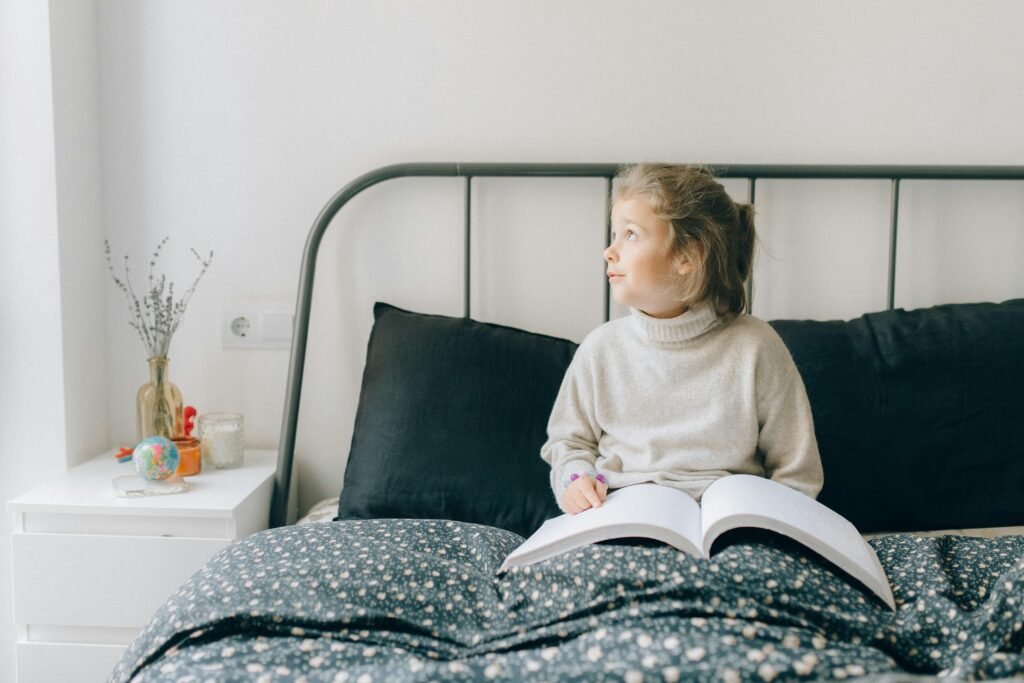
And remember, quality sleep beats long sleep. You can sleep for 9 hours and still feel tired if it wasn’t deep, uninterrupted rest. Blue light makes that kind of sleep harder to get.
Give your child the gift of a full, refreshing night’s sleep. It’s one of the best ways to help them feel great the next day.
Students who use screens in bed are twice as likely to report poor concentration in class
When kids take their screens to bed, they often stay up much later than they should. Whether it’s watching videos, scrolling through social media, or playing games, the screen light and the content both keep the brain active. The next day, that same child might find it hard to focus. In fact, they’re twice as likely to say they have trouble concentrating in school.
Poor concentration doesn’t always look dramatic. Sometimes it’s just forgetting what the teacher said five minutes ago. Other times it’s staring at a question without knowing where to start. This can lead to frustration, lower grades, and even a loss of self-confidence.
One simple fix is removing screens from the bedroom completely. Make the bedroom a place for rest, not for entertainment. Create a family “tech drop zone” in a hallway or kitchen, where devices are charged overnight.
Also, help your child build a relaxing bedtime habit that doesn’t involve screens. Try drawing, writing in a journal, or a small chat about their day. These routines help their brain slow down and get ready for sleep.
Good focus starts with good rest. And that rest starts with turning off the glowing screens.
Sleep-deprived kids show 30% more errors in attention tasks
Sleep helps the brain stay sharp. When a child is tired, their brain doesn’t process information as clearly. In tests, kids who are short on sleep make 30% more mistakes on attention tasks. These are simple tasks like spotting patterns, remembering numbers, or following directions—basic skills they need every day at school.
This doesn’t mean the child is lazy or distracted on purpose. Their brain is simply not working at full power. Blue light at night adds to the problem by making it harder for them to fall asleep and stay asleep.
Helping your child avoid these mistakes starts with making sleep a nightly priority. Get them into bed at the same time every night—even on weekends. Limit sugary snacks or heavy meals close to bedtime. And of course, limit screen use at least one hour before sleep.
Sometimes, kids resist these rules. That’s okay. What matters most is building routines they can stick with. You can even talk to them about how fewer mistakes mean better grades, less frustration, and more time for fun. That makes it easier for them to care about making changes.
Better attention comes from better rest—and better rest starts the night before.
Using a tablet before bed can delay melatonin production by 2 hours
Tablets may seem small and harmless, but they’re powerful when it comes to affecting sleep. When a child uses a tablet before bed, the light from the screen can delay melatonin production by up to 2 hours. That means their body doesn’t even begin to feel sleepy until long after they’ve put the device down.
So they lay in bed, eyes wide open, wondering why they can’t fall asleep.
This delay in melatonin doesn’t just ruin one night—it affects the entire week. Kids may start falling asleep later and waking up tired. They drag through the day and struggle in class. All because of one screen session before bed.
You can solve this by making screen-free time before bed a family rule. Set a clear “no screen” hour before lights out. Keep books, toys, and quiet activities nearby. Help your child understand that tablets are not bedtime toys.
If your child loves their tablet, make it a reward for earlier in the day. Maybe they can earn screen time right after homework, but not before bed. This teaches balance and gives them something to look forward to—without stealing their sleep.
Melatonin is like the body’s bedtime bell. Let it ring on time by turning the screens off early.
Students who sleep less than 6 hours perform 20% worse in problem-solving tasks
Problem-solving is more than just math—it’s figuring things out, thinking critically, and making smart choices. When a child doesn’t get enough sleep, especially less than 6 hours, they perform 20% worse in problem-solving tasks. That’s a major drop in brain power.
The brain needs rest to make connections. Without it, kids might get stuck on simple questions or feel overwhelmed when things get tricky. This isn’t about how smart they are—it’s about how rested their brain is.
To help your child improve their problem-solving skills, start by protecting their sleep. Count backwards from their wake-up time to find a bedtime that gives them 9 full hours. Stick to this schedule every day, even on weekends.
Help your child practice solving small problems during the day—like puzzles, riddles, or games that make them think. But don’t force it at night. That’s the time for calming down and letting the brain relax.
Also, remind your child that being well-rested helps them solve problems faster and with less frustration. That’s a superpower worth building.
Blue light filters can reduce melatonin suppression by up to 50%
If your child must use a screen before bed—for homework or reading—a blue light filter can help. These filters can reduce melatonin suppression by up to 50%. That means the brain can still make some melatonin, even if a screen is used.
Filters can be software-based (like Night Shift or Night Light settings) or physical screen protectors you attach to the device. Some glasses also block blue light and are designed just for evening use.
But here’s the truth: even with a filter, screens still affect sleep. The brain stays alert, and it’s easy to lose track of time while scrolling or playing. Filters help, but they’re not a magic fix.
Use them as a backup, not a first choice. Teach your child that screens and sleep don’t mix well. Try to keep bedtime as a no-screen zone. Filters are useful for the times you can’t avoid screens, but they should not become an excuse to keep using devices at night.
And always make sure the screen is dimmed. Even with blue light reduced, a bright screen in a dark room is still stimulating. Lower brightness, use filters, and limit time.
Give your child the tools to protect their sleep—but also the wisdom to know when to put the tools down.
80% of high schoolers report screen use within 1 hour of bedtime
It’s no surprise that screens are a big part of teenage life. But did you know that 80% of high schoolers use screens within just one hour of bedtime? That’s nearly every teen—and it’s becoming a serious sleep problem.
When teens scroll social media, text friends, or watch videos right before sleep, their brains stay in “alert mode.” Even after the device is off, their mind keeps spinning. This can delay sleep, reduce sleep quality, and make it harder to wake up refreshed.
Teens often feel like they “need” their phone at night—to relax, stay connected, or keep up with friends. But this habit is hurting their ability to focus, learn, and stay emotionally steady.
The first step to helping your teen? Don’t just ban screens. Talk about why sleep matters. Share the real effects of nighttime screen use and ask how they feel after a late night on their phone versus a good night’s sleep.
Try offering alternatives like audiobooks, calming playlists, or a simple bedtime podcast. These can still feel engaging but are much better for sleep than a bright screen. Create a family rule that devices are docked outside the bedroom—and stick to it together.
Make nighttime a screen-free zone, and your teen’s brain will thank you the next morning.
Reading on paper instead of a screen results in 10% better sleep quality
There’s something magical about a good book before bed—but only if it’s on paper. Research shows that kids who read from paper instead of a screen sleep 10% better. That might not sound like a lot, but it’s enough to boost learning, memory, and mood the next day.
Screens shine light directly into the eyes, stimulating the brain and reducing melatonin. Even an e-reader with a backlight can cause sleep delays. Paper books, on the other hand, don’t give off light. They help the brain wind down without distraction.
Also, reading a book (rather than swiping through a screen) slows down the pace of the evening. It gives the child a natural signal that bedtime is near. Their heart rate drops, their muscles relax, and the brain gets ready to sleep.
To make this habit stick, build a small library near your child’s bed. Choose books they enjoy—funny ones, silly ones, or stories about things they love. Let them pick their bedtime book so it feels like their choice, not a chore.
Even 10 minutes of reading can help. It’s a simple shift that gives better rest, stronger learning, and calmer evenings.
Even dim blue light can delay circadian rhythms by over 1 hour
Circadian rhythms are the body’s natural clock. They tell us when to feel awake and when to feel sleepy. But even dim blue light—like a phone screen on low brightness—can push that clock back by over an hour.
That’s like setting your child’s bedtime from 9:00 to 10:00 without them knowing. Their body is suddenly on a new schedule, and it doesn’t line up with school or morning plans.
This can cause groggy mornings, mood swings, and trouble staying focused. Over time, a late circadian rhythm can become a regular sleep disorder—something that takes months or years to fix.
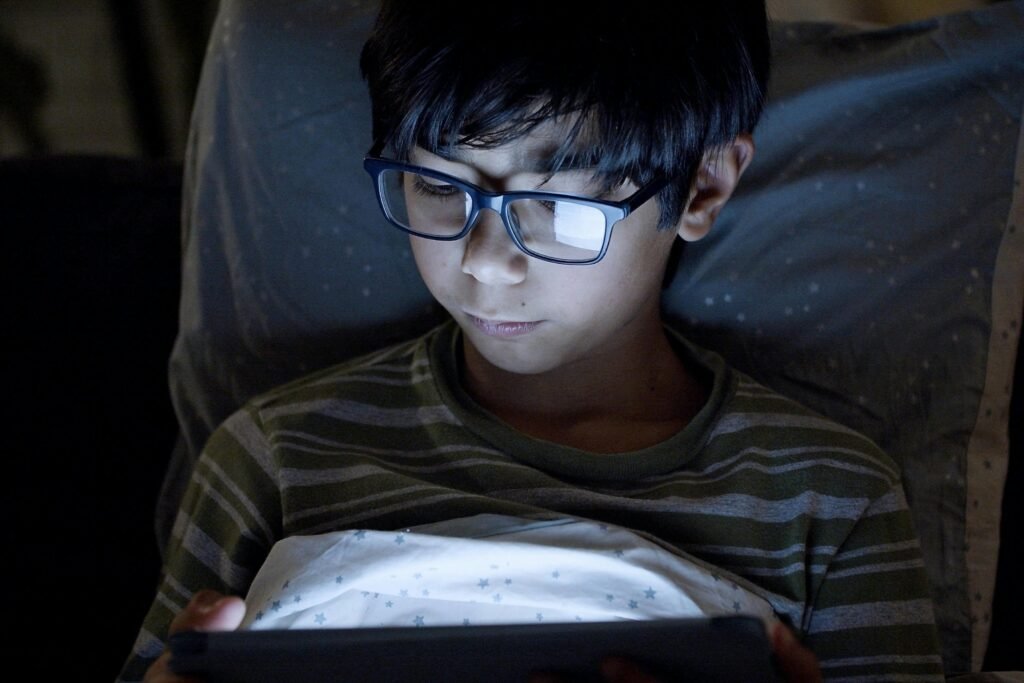
What can you do? Start by reducing all light exposure in the hour before bed. Lower the lights in your home. Avoid ceiling lights and switch to lamps with warm tones.
And absolutely no screens in the last hour. Not even on “dark mode.” Instead, help your child do something quiet that doesn’t involve light—like journaling, drawing, or storytelling.
By protecting their natural clock, you help your child sleep at the right time and feel their best all day long.
30% of students report falling asleep in class due to poor sleep
It’s happening in classrooms every day—kids literally falling asleep at their desks. About 30% of students say they’ve dozed off during school, and most of the time, it’s because they didn’t get enough sleep.
This doesn’t just affect one subject or one test. A tired brain struggles in every part of school—reading, writing, math, listening, speaking, remembering. And it’s not always the child’s fault. Blue light and screen time are often to blame.
If your child is coming home tired, cranky, or complaining that school is boring, it might be time to look at their sleep habits. Are they staying up late on their phone? Watching YouTube in bed? Sending messages after lights out?
Help them understand that falling asleep in class is a sign their brain is exhausted. It’s not just embarrassing—it’s their brain waving a red flag.
Set clear sleep boundaries at home. Encourage a wind-down routine that starts well before bedtime. Take screens out of the bedroom entirely. If they need an alarm, use an old-fashioned one—not a smartphone on the pillow.
A well-rested child stays awake, alert, and engaged. Don’t let tiredness take over the school day.
Nighttime screen use is associated with a 60% increase in difficulty falling asleep
The numbers say it all. Kids who use screens at night are 60% more likely to have a hard time falling asleep. That’s a massive increase in bedtime struggles, tossing and turning, and frustration.
Why does this happen? It’s not just the blue light. It’s the excitement, the mental stimulation, the emotions from the content they’re watching or reading. A funny video, a scary game, or a dramatic story—all of these get the brain buzzing instead of winding down.
Then the child lays in bed, staring at the ceiling, wondering why they’re still awake. Parents might think they’re being “difficult” at bedtime, but in reality, their brain simply isn’t ready to sleep.
To fix this, flip the script. Make bedtime a time of peace, not play. Shut off screens early. Make sure the last 30 minutes are slow, quiet, and gentle. Use soft lighting, quiet voices, and calming activities.
And don’t forget: consistency is key. The more often your child follows a screen-free wind-down, the faster their brain will learn the rhythm of sleep.
Sleep isn’t a switch—it’s a slow fade. Give your child space to fade into rest, not crash into it.
Kids aged 6–12 who use screens at night get 2 hours less sleep per week on average
Two hours might not sound like much at first. But for growing children between the ages of 6 and 12, losing two hours of sleep every week adds up fast. That’s over 100 hours of sleep lost in a year—all because of screen time at night.
What happens when sleep is consistently cut short? Kids get irritable. They struggle with simple tasks. They might lose interest in school or activities they once loved. Even their immune systems can weaken, leading to more sick days.
The problem is, most kids (and parents) don’t even realize it’s happening. A quick cartoon before bed or a few minutes of a game doesn’t seem like a big deal. But the screens delay sleep, reduce deep rest, and change the brain’s rhythm.
If your child is in this age group, it’s the perfect time to build great sleep habits. Make a “no screens after dinner” rule. This is easier to follow when you offer fun alternatives—like a puzzle, drawing time, or family reading.
Also, model good habits. If your child sees you scrolling in bed, they’ll copy it. Show them that you value rest too. Use a book, turn down the lights, and stick to bedtime routines that work.
When kids get enough sleep, they feel better, learn faster, and grow stronger—in every way.
Sleep loss as little as 90 minutes can reduce alertness by 32%
Sometimes it seems like a late night isn’t such a big deal. What’s an extra hour here or there? But even losing just 90 minutes of sleep can make a child 32% less alert the next day.
That’s nearly one-third of their mental sharpness, gone. They might miss instructions, forget steps, or get confused more easily. It’s not about being lazy—it’s about a tired brain not keeping up.
Alertness is essential for learning. It helps kids catch small details, stay on track, and react quickly. It also keeps them safer, especially when crossing streets, playing sports, or using tools in class.
So how can you protect that alertness? Think of sleep as brain fuel. You wouldn’t send your child to school without breakfast. Don’t send them without sleep either.
Avoid big changes to bedtime on weekends. Try to keep it within the same hour every night. And notice when your child is starting to get sleepy—don’t wait until they’re overtired. That’s when falling asleep becomes harder.
When kids are well-rested, they don’t just stay awake—they shine.
Blue light from phones is 35% more disruptive to sleep than from TVs
Not all screens are equal. A phone screen is 35% more disruptive to sleep than a TV. Why? Because phones are usually closer to the eyes, brighter, and used interactively—scrolling, tapping, messaging.
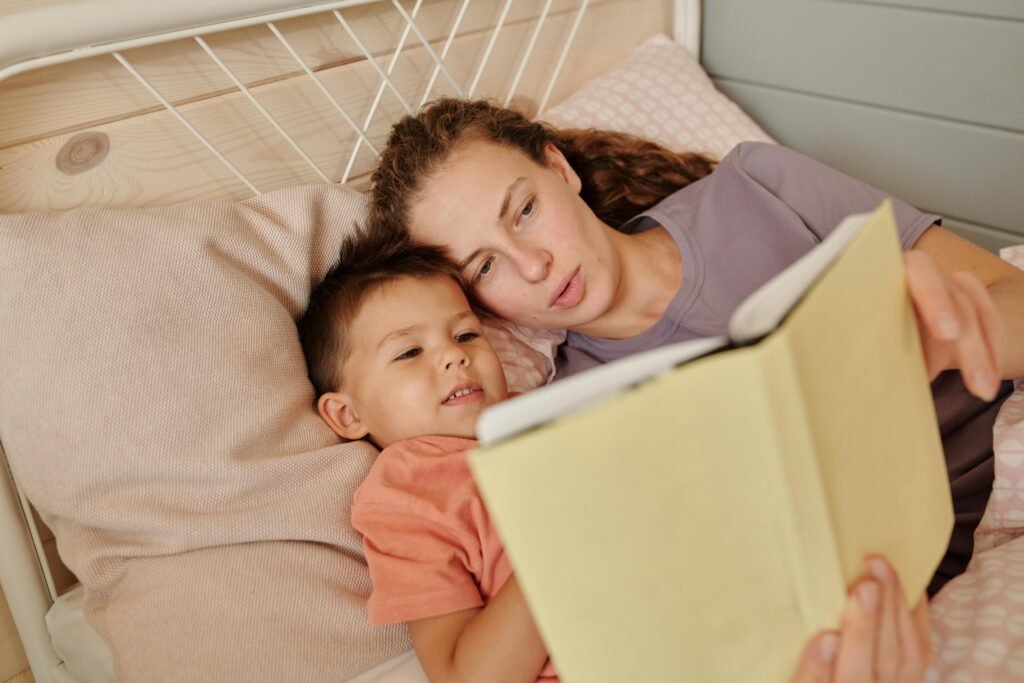
That means your child might be watching the same cartoon on a phone or on a TV, but the phone will hurt their sleep more. The closer the light, the deeper the impact.
Also, phones are personal. They’re more tempting to use under the covers, late at night, and without supervision. That makes them harder to control.
The solution? Keep phones out of the bedroom. Set a “charging station” in another room and make it a rule that phones go there before bed. If your child uses a phone for music or white noise, switch to a separate device that doesn’t have a glowing screen.
Teach your child that the farther the screen is from bedtime, the better their sleep will be. It’s not about taking away tech—it’s about protecting their body and brain.
Phones are powerful tools. But they don’t belong in bed.
Kids who sleep well perform up to 40% better in reading and math
Now here’s some good news: when kids get the sleep they need, they don’t just feel better—they perform up to 40% better in reading and math. That’s like turning a C into an A, just by sleeping better.
Why does this happen? Because sleep strengthens memory, focus, and problem-solving. The brain uses sleep time to store what it learned, connect ideas, and get ready for new challenges.
When a child is rested, they’re more likely to understand what they read, remember what they studied, and stay with a tricky math problem until they solve it.
So instead of staying up late to study, teach your child to go to bed early. The earlier sleep starts, the more learning sticks. And learning becomes easier—not harder—the next day.
Celebrate sleep as part of school success. Help your child see that bedtime is not a limit—it’s a launchpad. Rested kids don’t just learn more—they enjoy learning more.
Sleep-deprived children are 2x more likely to struggle with anxiety and focus
Poor sleep doesn’t just affect school. It affects emotions too. Children who don’t sleep well are twice as likely to struggle with anxiety and attention. That means more worries, more tears, and more trouble staying calm and focused.
When the brain is tired, it’s also more reactive. That’s why small problems feel bigger, and little challenges seem overwhelming. Tired kids might cry more easily, argue more often, or shut down when something gets hard.
You can help by protecting their sleep first. Set clear bedtime routines. Avoid screens. Keep their room calm and dark. These things lower stress and teach the brain to relax.
Also, talk about emotions. Help your child name what they feel. Teach them to connect mood with sleep. Ask, “Do you think you’re more worried when you’re tired?” Let them reflect.
If anxiety or focus is becoming a daily issue, don’t just look at school—look at sleep. Often, it’s the quiet fix that changes everything.
Teens exposed to blue light before bed show 24% lower performance in next-day tests
Tests can be stressful. But imagine walking into one with your brain already 24% slower than usual. That’s what happens when teens are exposed to blue light before bed. Their test performance drops by nearly a quarter.
Why? Because blue light ruins deep sleep. And deep sleep is what helps the brain organize and recall information. When it’s missing, the brain can’t “find” answers it actually knows.
If your teen has an important test coming up, don’t just say “study hard.” Say, “Sleep well.” Make the night before the test screen-free. Let them go to bed early. Keep their room quiet, dark, and cool.
If they need to review in the evening, use paper notes—not a glowing screen. And remind them that success isn’t just about what they know. It’s about how well their brain works under pressure.
Sleep gives the brain that edge. It’s the best study hack out there.
Just 3 nights of poor sleep can impair recall and learning speed by 25%
Sometimes, it only takes three nights of poor sleep for things to start slipping. Kids who miss quality rest for even a few days can see their recall and learning speed drop by 25%. That’s a big hit to their ability to keep up in class, remember lessons, and stay confident.
Think about it like this: your child goes to school every day and tries to learn something new. But without sleep, their brain acts like a whiteboard that won’t hold the marker. The words go on, but they fade too fast. They forget, lose focus, or get things mixed up.
This doesn’t just affect tests or homework. It hurts participation, confidence, and their sense of capability. Over time, that can make school feel harder than it really is.
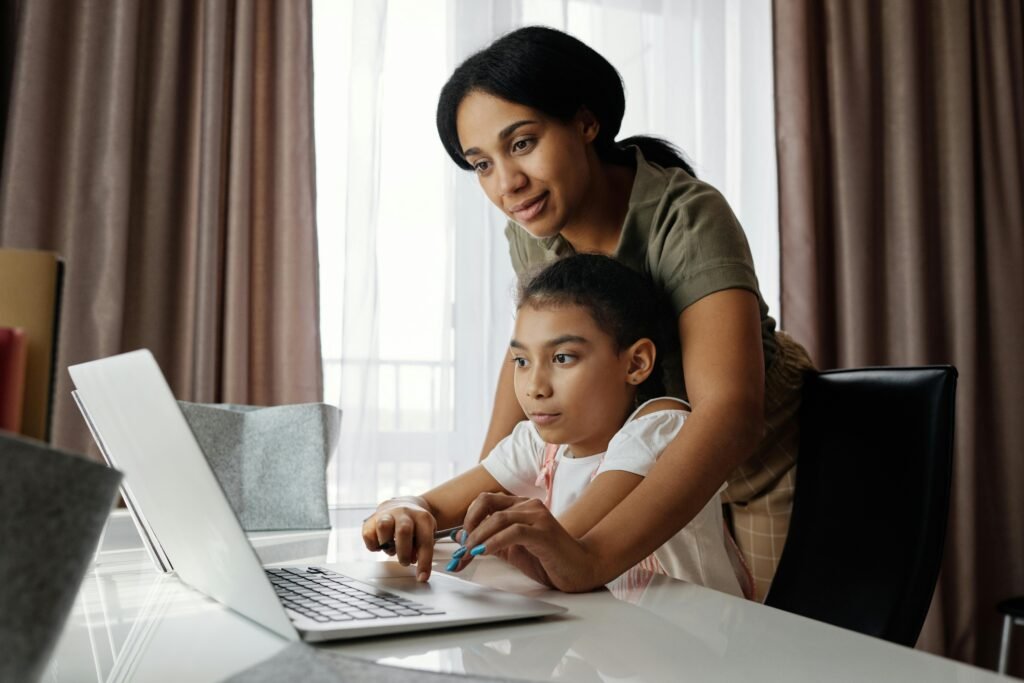
So don’t wait for “perfect sleep.” Focus on consistent sleep. Catch problems early. If your child is having trouble falling asleep, look at screen use first. Even a small break from screens at night can start to reverse the damage.
Create a steady rhythm: same bedtime, same wake-up, even on weekends. Use the same wind-down steps. Keep the room cool, quiet, and dark. These small things protect the brain’s ability to remember and grow.
Just three bad nights can make a big difference—but so can three good ones. Start tonight.
Blue light exposure in the evening increases cortisol levels by 21%, making it harder to wind down
Cortisol is the body’s stress hormone. It helps us stay alert and respond to challenges. But at night, we want cortisol to drop so we can relax. Unfortunately, blue light exposure increases cortisol by 21% in the evening, making it harder for kids to wind down and fall asleep.
Imagine trying to sleep while your body thinks it’s time to run, think, or solve problems. That’s what blue light does—it keeps the “go mode” turned on when it should be off.
This is why even after putting down the phone, some kids still feel restless. Their brain and body are still flooded with cortisol. They toss, turn, or feel wired even if they’re tired.
To help, remove the cause. Shut off screens at least an hour before bedtime. Create a calm evening atmosphere with soft lighting, low voices, and relaxed activities. A warm bath, calming music, or storytelling can help lower cortisol naturally.
Also, cut down on anything exciting right before bed—no scary stories, no dramatic conversations, and no high-energy games.
When cortisol stays low at night, sleep comes faster—and stays deeper. Protect your child’s calm by protecting their evening light.
Students who sleep 8–9 hours per night show 15% faster reaction times
Sleep isn’t just about being rested. It also improves speed. Kids who get 8 to 9 hours of sleep each night show 15% faster reaction times in tasks and learning. That means their brains work faster and respond better to new information.
This is especially important in subjects like math and science, where quick thinking matters. But it also helps in everyday moments—like answering a teacher’s question, keeping up with classroom discussions, or even staying safe on the playground.
If your child often seems slow to respond, don’t just push them harder. Ask about their sleep. Are they staying up too late? Using screens in bed? Struggling to fall asleep?
The fix might not be tutoring—it might be rest.
Create a steady routine that lets them get 9 full hours of sleep. Set a tech cut-off time in the evening. Make mornings consistent too—waking up at the same time each day helps the body sleep better the next night.
When the brain is well-rested, it doesn’t just get the answers right—it gets them faster.
Even 10 minutes of blue light exposure can disrupt melatonin levels in sensitive individuals
You might think short screen use won’t hurt. But for some children—especially those sensitive to light—just 10 minutes of blue light can affect their melatonin levels. That tiny bit of time can make the body miss the signal that it’s time to sleep.
This means a “quick check” of the phone, a few minutes of a cartoon, or a short game can still throw off the body’s natural sleep rhythm.
For sensitive kids, this becomes a bigger issue. They might already have trouble falling asleep or staying asleep. Blue light makes the problem worse.
How do you help? First, know if your child might be sensitive. Do they get “wired” easily at night? Take longer to fall asleep than others? Wake up tired even after long nights?
If yes, they may need even stricter boundaries around light at night. Remove screens from the room entirely. Use red or amber nightlights if they need one. Avoid any light-based distractions for at least 60 to 90 minutes before bed.
Let their body fall into its natural rhythm. Sleep isn’t just about time—it’s about timing. Protect that signal, and they’ll sleep better every night.
Students who use screens at night are 2x more likely to have irregular sleep patterns
Irregular sleep doesn’t just mean going to bed late. It means shifting bedtimes, unpredictable wake-up times, and sleep that doesn’t follow a healthy rhythm. When students use screens at night, they’re twice as likely to fall into this pattern.
This affects their body clock, also called the circadian rhythm. It’s like setting your watch differently every day—it gets harder and harder to tell time. The brain can’t prepare for sleep at the right moment. It also struggles to wake up feeling refreshed.
These shifts confuse everything: energy levels, appetite, focus, mood. Kids might fall asleep in class one day, then stay wide awake the next night, stuck in a cycle that’s hard to break.
To prevent this, focus on regularity. Choose a bedtime and stick to it—even on weekends. Wake-up times should also be consistent, with no more than a one-hour difference. Shut off screens well before bed and use relaxing cues like reading or music to signal sleep time.
The goal is rhythm. When sleep follows a steady beat, the whole body feels better.
Kids with consistent sleep schedules show 33% better emotional regulation
One of the lesser-known benefits of sleep is emotional control. Kids who sleep well and go to bed at the same time each night show 33% better emotional regulation. That means fewer outbursts, less anxiety, and more patience during tough moments.
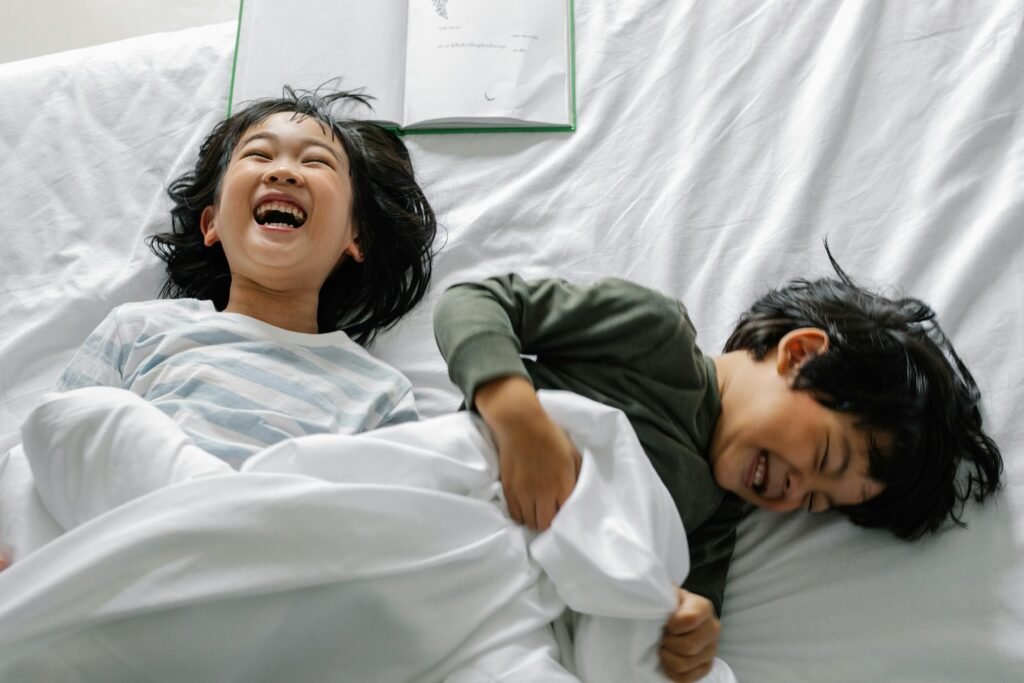
Why? Because sleep helps the brain reset its emotional systems. Without it, the part of the brain that controls emotions becomes hyperactive, while the part that calms us down doesn’t work as well.
The result: a tired child may cry more easily, argue over small things, or shut down when frustrated. Parents often wonder, “Why is my child acting out?” Sometimes, the answer is just—they’re not sleeping well.
Make emotional strength a reason to sleep. Talk to your child about how rest helps them feel more in control. Link good days to good nights.
Stick to routines, keep screens off, and build a bedroom space that feels safe and cozy. Emotional growth isn’t just about discipline—it’s about rest.
Screen-free families report 23% higher bedtime satisfaction in kids
What’s bedtime like in your house? Peaceful? Or a nightly battle? Research shows that families who limit screens at night report 23% higher bedtime satisfaction—especially from kids.
That means fewer fights, less stalling, and more cooperation. Kids who don’t have screens before bed fall asleep faster, argue less, and wake up in better moods.
Bedtime satisfaction matters. It sets the tone for the whole night and the next day. When sleep starts with calm, it usually ends with better rest.
To make bedtime smoother, turn it into a calm, screen-free ritual. Create a “quiet hour” where everyone in the house slows down together. No phones, no TV, just soft light, simple conversations, and comforting activities.
Let your child take the lead in part of their bedtime routine—choosing the story, setting the pillow just right, or picking pajamas. This gives them a sense of control and helps them settle more easily.
Happier nights lead to happier mornings. Screens out, peace in.
Kids who sleep with screens in their room sleep 30 minutes less per night
Here’s a simple fact with a big impact: children who sleep with screens in their room—phones, tablets, TVs—get 30 minutes less sleep per night. That’s over 3.5 hours every week lost to something that shouldn’t even be part of bedtime.
Even if the screen isn’t being used, the light from a notification or the temptation to “just check one thing” can delay sleep. And the more accessible the device, the more likely the habit becomes.
The solution? Take screens out of the bedroom—completely. Set a family rule that devices are charged in the kitchen, hallway, or anywhere that isn’t near the bed. Use this as a boundary, not a punishment.
If your child uses a screen for white noise, swap it for a fan or a sound machine. If it’s their alarm clock, buy a real one. These changes may feel hard at first, but within a few nights, most kids adjust—and sleep longer and better.
Every minute counts. Protect those 30 minutes, and you’ll see the results in school, behavior, and energy.
Well-rested children are 45% more likely to enjoy school
Sleep doesn’t just help kids learn—it helps them love learning. Studies show that well-rested children are 45% more likely to enjoy school. They’re more engaged, more curious, and more confident.
Why? Because when they’re not exhausted, the classroom becomes a place of discovery, not frustration. They feel good about their abilities. They can follow along, join in discussions, and stay with lessons until the end.
Enjoying school leads to better attendance, stronger friendships, and higher self-esteem. And it all starts with a good night’s sleep.
So if your child is dreading school or seems unmotivated, look at their sleep habits. Are they getting the rest they need to feel strong and alert?
Shift the conversation from “You need to sleep” to “Sleep helps you enjoy tomorrow.” Build a bedtime routine that supports joy, not just rest.
Happy sleepers make happy learners.
Sleep boosts creativity in children by up to 50%
Creativity is often seen as a natural talent—but it’s also powered by sleep. Children who get enough sleep show up to 50% more creativity in problem-solving, storytelling, art, and invention.
Sleep allows the brain to connect different ideas, explore imagination, and take mental “leaps.” It’s the brain’s way of dreaming up new solutions and ideas.
If your child loves building, drawing, or inventing, encourage them to protect their creativity with sleep. Remind them that their brain works on creative ideas even while they sleep.
For creative kids, use this as motivation: “Want your best ideas? Go get great sleep.” Make bedtime a part of their creative routine. Let them sketch before bed, write in a journal, or tell stories out loud. Then, lights off—so the brain can keep creating in dreams.
The mind needs quiet to create. Sleep is where ideas grow.
A single night of poor sleep can cause hyperactive behavior the next day
Parents are often surprised when their tired child acts wild instead of sluggish. But it’s true—a single poor night of sleep can trigger hyperactive behavior the next day.
Why? Because the brain tries to stay awake by going into overdrive. Kids become fidgety, loud, impulsive, or overly silly. It looks like they’re full of energy, but it’s just the body’s way of staying awake.
This behavior is often mistaken for bad behavior or even ADHD. But sometimes, the cause is just poor sleep.
To fix it, help your child recover quickly. Make the next night screen-free, calm, and early. Encourage physical activity during the day—but not right before bed. Use warm lighting in the evening and a steady routine.
And don’t scold hyperactivity without asking, “Did they sleep enough?” Often, the answer will explain more than we realize.
Children with better sleep show 34% more confidence in class participation
Confidence matters in school. Kids who sleep well show 34% more confidence when speaking up, answering questions, or trying new things in class.
This isn’t just about knowing the answer—it’s about feeling secure, calm, and ready. Sleep gives kids the emotional balance and mental clarity to raise their hand, join a group, or share an idea.
To build confidence, build sleep first. Let bedtime be a time of reassurance, not stress. Avoid arguments or anxiety near sleep time. Give praise for great sleep habits and explain how rest helps their brain work better in school.
The next time your child participates proudly, connect the dots: “See how strong you are after a good night’s sleep?”
It’s a small habit with big confidence returns.
Good sleep habits can raise a child’s overall academic performance by up to 20%
Want to boost your child’s academic success? Before signing up for tutoring or extra homework, start with sleep. Good sleep habits alone can improve academic performance by up to 20%.
That’s the result of better memory, attention, creativity, emotional control, and energy—all linked directly to sleep.
So what are “good habits”?
- Set a consistent bedtime and wake-up time
- Keep screens out of the bedroom
- Avoid heavy meals and sugary snacks at night
- Use quiet, relaxing activities before sleep
- Stick to the routine—even on weekends
These changes don’t cost anything. But they can make a huge difference in how your child performs and feels at school.
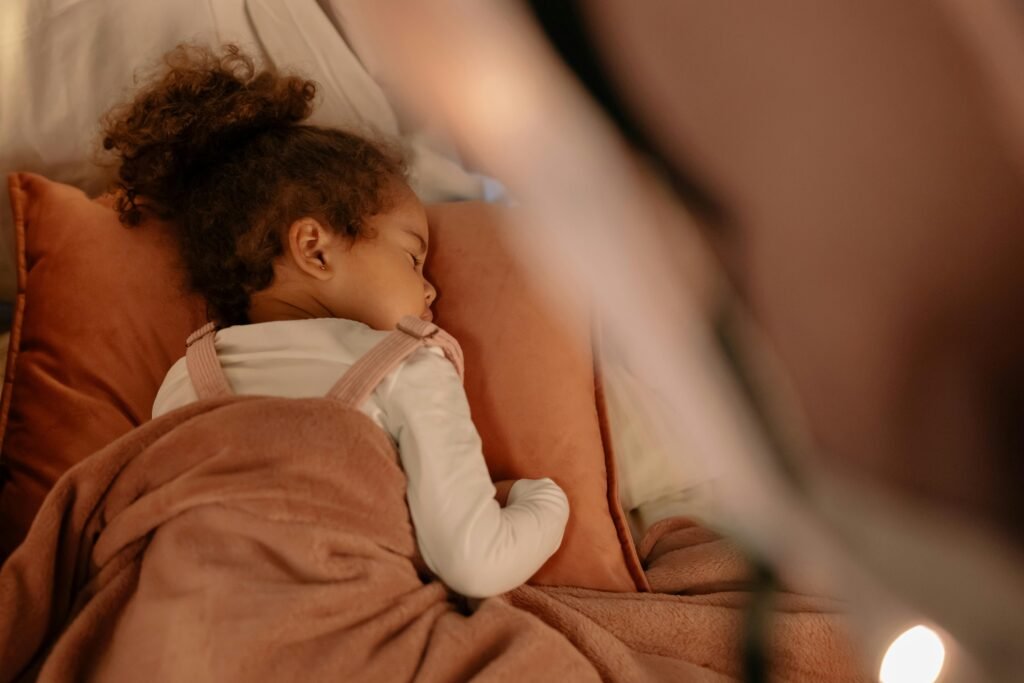
Start tonight. Better sleep, better school.
Conclusion
We’ve explored 30 powerful facts that show just how much blue light and screen time at night can affect sleep, learning, and life.
The message is clear: screens are useful, but they don’t belong in the bedtime routine. Just one change—removing screens from your child’s bedtime—can unlock better sleep, better focus, and better learning.
